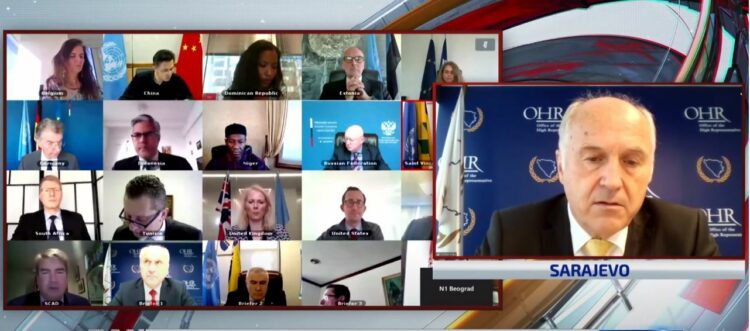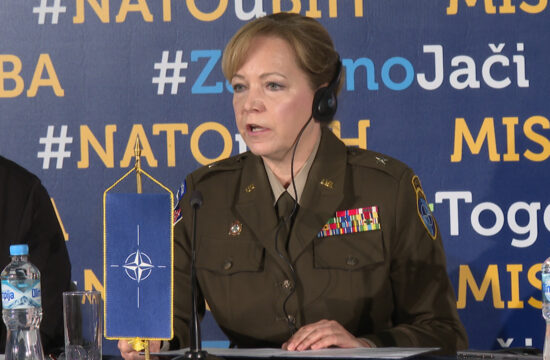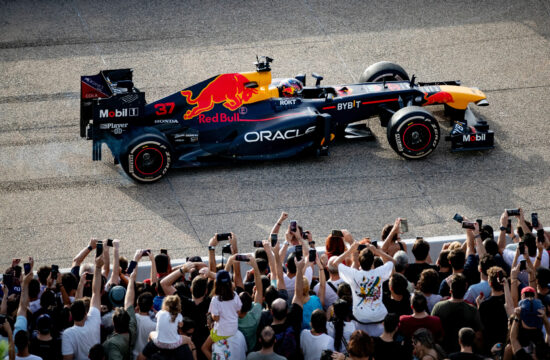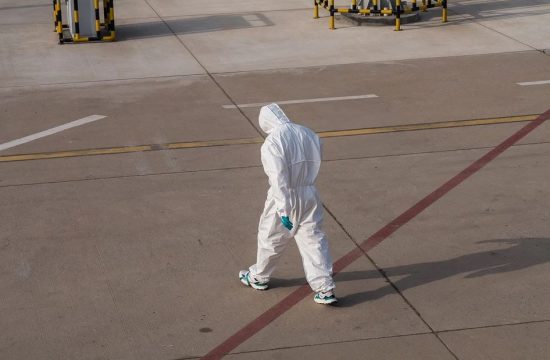
Bosnian Serb leader Milorad Dodik can either change the name of the student dormitory in Pale, which was named after convicted war criminal Radovan Karadzic, or he can face the consequence of becoming an “unacceptable politician in the EU,” Bosnia’s international administrator, High Representative Valentin Inzko, told N1 on Friday.
Inzko, the Austrian diplomat tasked with overseeing the civilian implementation of the 1995 Dayton Peace Agreement which ended the Bosnian war, presented his latest report on the situation in Bosnia and Herzegovina to the UN Security Council on Thursday.
He subsequently told media he would ask the EU to ban all politicians who deny genocide and glorify war criminals when he presents his next report in May 2021.
The student dormitory named after Karadzic is located in Pale, near the Bosnian capital and in Bosnia's Serb-majority semi-autonomous Republika Srpska (RS) entity. Karadzic was sentenced to life in prison for genocide and other war crimes he had committed during the 1992-95 war in Bosnia by a UN court.
Dodik, who is the Serb member of Bosnia’s tripartite Presidency and the leader of the ruling party in Republika Srpska, was the one to ceremonially open the student dormitory.
The High Representative has been advocating for Bosnia to adopt a law on banning genocide denial and the glorification of war criminals for years.
“I am a patient man, I already reported about it in the Security Council at the beginning of May, saying that it is unacceptable,” he said, adding that glorification of war criminals represents an insult to the victims and that he also reiterated that position at the Srebrenica Genocide commemoration ceremony on July 11 in Potocari.
“If that (plaque) is not removed, then I will ask the Security Council next May for the EU to ban entry to all those who deny genocide and glorify war criminals,” he told N1, adding that a week ago the German Foreign Affairs Minister said something similar, “that there is no place in the EU for those countries that glorify war criminals.”
“Imagine some Austrian glorifies Nazi leaders and names things after a Nazi. That is unacceptable,” he said, adding that he is glad that the Russian UN Representative also called glorification of war criminals unacceptable.
“Dodik has the possibility to remove this plaque or to change it,” Inzko said, adding that “there are many possibilities” that are acceptable options, such as putting up the name of writer Ivo Andric, who was born in Bosnia and died in Serbia, or that of Nikola Tesla, for example.
Inzko said that if Dodik refuses to do this, he must count on it that he will be an “unacceptable politician in the EU.
The issue of the dormitory, as well as the initiative for a moment of silence in the Presidency for late convicted war criminal Momcilo Krajisnik, both came from Dodik, Inzko pointed out.
The Austrian diplomat also said that he mentioned the issue of organising holy masses for Bosnian Croat war criminal Dario Kordic who was sentenced to 25 years in prison for war crimes against Bosniaks.
“They even offered him a possibility to speak at some university in Zagreb,” Inzko pointed out. “Imagine a war criminal talking to future generations, the future elite of Croatia. That is unacceptable.”
Inzko has been saying for years that he might use his special ‘Bonn powers’ to impose a law on genocide denial in Bosnia and Herzegovina.
He said that, for the UN Security Council, there is no excuse for glorifying war criminals and genocide denial.
“Yesterday, for the first time, one delegation – Germany – demanded that such a law be adopted,” he said, adding that he is grateful to Germany’s UN Ambassador for that statement.
“He is a long-time advisor for foreign policy to Angela Merkel and has a lot of support. Now there is a concrete demand to adopt such a law,” Inzko said.
“There is time for that, but I am concretely thinking about it because support for it is growing,” he said, arguing that such a law is completely normal and that all EU countries have it.
He mentioned the example of an English historian who was a Holocaust denier and was sentenced to three years in prison, adding that “this is the way to solve such problems.”
The High Representative also commented on the separate reports on the situation in Bosnia which Republika Srpska sends to New York. He said that he did not notice that anybody reads those reports.
“Of course, the Russian Embassy mentions that document, I also talked about this yesterday. According to the Dayton Agreement – only the High Representative is asked to submit a report. No one else. Official UN documents must pass through the Bosnian Embassy in New York or the Ministry. Those papers were sent to New York, but not via the institutions,” Inzko explained.
The Croat National Assembly in Bosnia (HNS BiH), an organisation made up of Bosnian Croat political parties, on Thursday rejected what it said were “false statements” in Inzko’s report and complained that the High Representative failed to include certain policies in the country which “trample on the rights of the constituent peoples.”
Meanwhile, Bosnia’s Foreign Trade Minister and member of Dodik’s party, Stasa Kosarac, argued that Inzko’s report does not represent the real situation in Bosnia and that the international administrator was biased in putting it together.Inzko said he expected such reactions and that he heard similar things from Russia’s UN representative on Thursday.
“I told him I am the rapporteur. I describe the real situation,” he said.
Inzko argued that what he told the UN Security Council is well documented as he included in his report footnotes that contain exact quotes by politicians.
“If the HNS says I said something wrong, they must present facts and disclose it. I am prepared to apologize if something I wrote is not true, this is reviewed by people in my office. They follow all conferences, all statements. We watch all the recordings, not only in regard to what someone wrote, but what they said as well. These are real quotes,” he explained.




